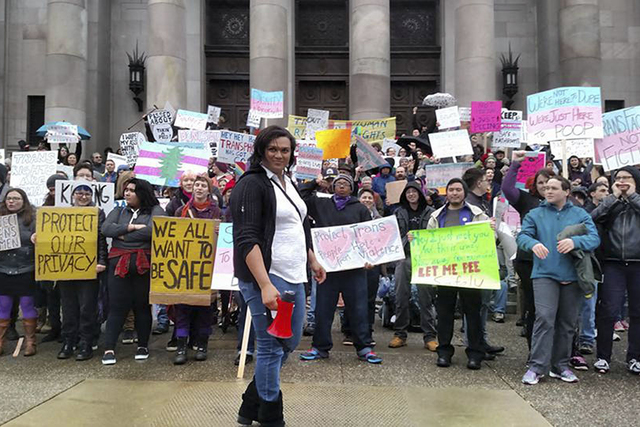Down in Dixieland, North Carolina and Mississippi continue to face severe scorn—and major divestment from PR-conscious corporations—over their recently passed laws ordaining discrimination against trans people.
But that hasn’t curbed the enthusiasm of anti-trans activists in this state, who are moving forward with efforts to place a measure on November’s ballot that would roll back civil-rights protections that have been on the books for 10 years by deliberately barring transgender people from bathrooms, locker rooms, and other gender-segregated facilities.
Signature-gathering for the measure is expected to begin in earnest soon, following a hearing in Olympia last week that finalized the language of the measure. In fact, the court skirmish may serve as an early preview of the sort of rhetorical battles that will be waged over the measure in the coming months.
Initiative 1505, sponsored by a group called Just Want Privacy, would, among other things:
• Declare “null and void” the Human Rights Commission’s rule guaranteeing transgender rights;
• Prohibit the HRC from ever writing another rule that guarantees transgender rights;
• Require public schools to maintain sex-segregated bathrooms and locker rooms, and prohibit anyone of the opposite sex from entering said rooms;
• Define “sex” as “the biological condition of being male or female as determined at birth based on a person’s anatomy, or, when necessary, at the chromosomal level”;
• And allow students to sue schools for $2,500 every time they see someone of the opposite sex in their restroom or locker room.
With all this in mind, the Attorney General’s office gave Initiative 1505 a basic title and summary, as it does with all ballot initiatives, stating that it “would repeal protections against gender-identity discrimination in certain public-accommodation facilities, require that public schools restrict access to specific facilities based on anatomical or chromosomal sex, and allow related lawsuits against schools.”
But Family Policy Institute executive director Joseph Backholm, a co-founder of Just Want Privacy, disputed this language as biased. In a recent blog post, he argued that the Attorney General’s office was “doing its best to interfere” with the ballot measure by using inflammatory language like “gender-segregated” and “allow related lawsuits against schools.”
His group, predictably, wanted something more like “enforcing a right to privacy” and, instead of “lawsuit,” “a cause of action for students who have their right to privacy intentionally violated by the school,” and went to court in hopes of having the summary changed. PFLAG, an LBGTQ-allied nonprofit, and the Washington Association of Sexual Assault Programs followed suit with their own challenge and associated recommendations for the measure’s language.
These kinds of word wars can have huge implications for ballot measures, but may be particularly important in this case, as backers of the initiative struggle to tamp down any association with discrimination in favor of more benign aims, like privacy.
“Most people, when voting on an initiative, or even signing a petition, don’t read the full initiative; they read the brief,” says Monisha Harrell, chair of Equal Rights Washington. “So it is really important that the title and the brief accurately reflect what the initiative will actually do.”
Harrell believes the AG’s language is more or less on point. If anything, “it softens what it is. I think, plainly, the initiative puts a bounty on trans students’ heads. If you are a trans student and you want to go to the restroom, there is now a $2,500 incentive to follow you into the bathroom and then complain about it.”
If the Just Want Privacy campaign wants to talk about everyone’s right to safety and privacy, she adds, the reasoning doesn’t follow: “They miss a step in logic in believing that some people’s rights are more valuable than others.”
“They’re talking about ‘We should pass these laws because of some potential, imagined danger,’ ” Harrell argues, but forcing “trans women into a men’s restroom puts them into actual danger.” The rates of sexual assault against trans people are unbelievably high. “This initiative is bad because of real danger. It’s not even something you have to imagine.” Ultimately, Thurston County Superior Court Judge Anne Hirsch rejected Just Want Privacy’s arguments, and made only slight changes to the ballot language, winning praise from LBGTQ groups.
“We hope the court-approved language will help voters understand that this initiative repeals our state’s discrimination protections, which have been in place for 10 years,” David Ward, who helped represent PFLAG and WCSAP, said after the hearing.
But while the ruling was a victory for the civil-rights groups in the courtroom, there is still the ballot measure to contend with.
“It is terrifying,” says Marlo Mack regarding the provision that targets schools. Mack is a Puget Sound resident and producer of an acclaimed podcast about her transgender daughter, now a second-grader. If this initiative passed, “I don’t see how I could feel safe sending her to school. There’s no way in the world I’m going to tell her that she has to use the boys’ bathroom. There’s no way that’s workable; she’s the girliest girl in the class. It would single her out from her peers, draw attention to her, shine the spotlight on her.” And, if it passed, she’d be “treated like a criminal. All she wants to do” in the bathroom “is quietly and discreetly pee. Apparently that is a dangerous act.”
And as a result, Mack adds, “I feel personally under attack. I am being told that my daughter and I are not welcome in Washington state. That’s what this initiative says to me.”
Still, there is a large and powerful coalition building to fight it, Harrell says, that already has the support of many elected officials, businesses, the LGBTQ community, and their allies. “If there’s any state that can fight this, it is Washington,” she says. “But we take nothing at all for granted.” E
sbernard@seattleweekly.com








